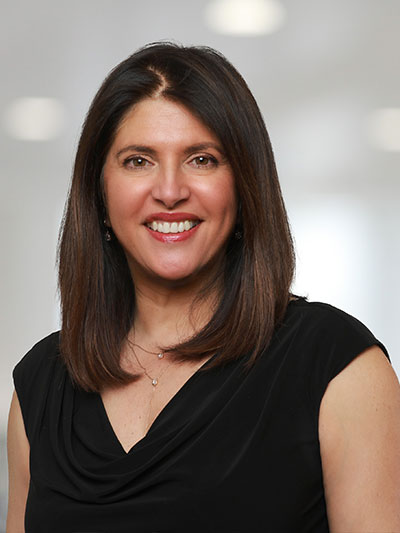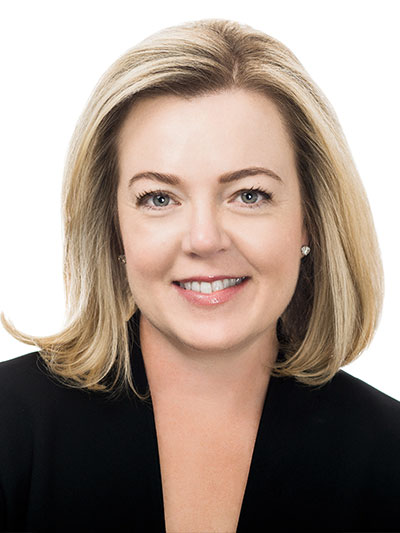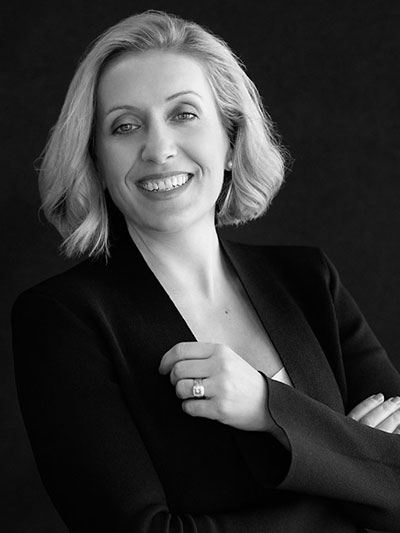Managing Partner at European private credit specialist MV Credit, Nicole Downer, took time out of her role as a Managing Director at Deutsche Bank to have her daughter. While she was considering a new family-friendly career as a teacher, MV Credit was recommended to her by a previous colleague.
Louise Watson, Managing Director at Natixis Investment Managers, of which MV Credit is an affiliate manager, concurs that a reinvention of the workplace is helping maintain talented women – and men. They are joined by Camilla Love, who founded the Future Females in Finance (F3) program to encourage more women to take up careers in finance, who weighs in on the need for diversity in financial services.

Nicole Downer, Managing Partner, Head of Investor Relations, MV Credit
Q: How has the working world changed during your career?
A: It was Henry Ford who said that if you always do what you always did, you’ll always get what you always got. He wasn’t referring to the hiring practices of financial services, but he may as well have been. When I started in the mid 1990s, financial services was almost exclusively men—and certain types of men—ambitious for power and money, prepared to do the work of two people to get ahead, and with a laser-like focus on work which ruled out other interests, or any thoughts of a work-life balance.
The world has changed fundamentally since the 90s, and slowly but surely financial services firms have begun to respond. There are lots of reasons for change – a turnaround in the way the world looks at working women for a start, but also because investors themselves are more diverse, and expect their investment managers to reflect that diversity, in gender, ethnic background and approach. Technology means the world is smaller, we invest globally so easily now, and our new, wider client base understands that homogenous teams get homogenous, rather than innovative outcomes.
If we take the Nordic experience, where we see the most gender-equal labour markets in the OECD, and ask what lies at the heart of their success, it’s the idea that facilitating employment for all adults is a key social responsibility – and that the government will provide the services and supports necessary to enable it, like free childcare. I’d love to say the UK, where I work, is on the verge of introducing universal childcare, but it’s probably a bridge too far to expect significant government intervention. It is possible, however, to expect employers to make diversity, flexibility and work-life balance a priority.
“Societies that are more gender-equal tend also to be happier, healthier, more trusting, more equal and inclusive.”
Q: What is needed to achieve diversity, rather than simply paying it lip service?
A: In my view, it’s the culture and ethos of the firm – and that starts at the top. At MV Credit, partners lead by example, live the work life balance – and trust their staff to manage their own time. There is an expectation that we will do what needs to be done – but we are judged on outcomes, not hours spent at our desks. And the proof of success is very much in our workforce statistics: private equity employs only 19 per cent women on average, whereas at MV Credit we employ 55 per cent. At a senior level, women typically make up 5 per cent of the industry; at MV Credit they make up 20 per cent.
“I spoke to other senior women, who were happy with the 12-hour days and hiring help at home, but that wasn’t a life for me – it’s about having the option”
Q: What further work/culture improvements are needed?
A: The industry has made progress, but there is more to be done to keep the momentum going. A few suggestions are:
- to introduce new, broader definitions of what it means to be ambitious, and of what professional success looks like. It shouldn’t be judged by the narrow career-focused, financial parameters of the past.
- make it acceptable for men to do all the things that we talk about making it easier for women to do: to work from home, to leave at 3pm to pick children up from school, and so on.
- senior women need to step up and accept their responsibility to mentor junior women – to resist feeling threatened, and to embrace others with complementary rather than identical skills.

Louise Watson, Managing Director, Natixis Investment Managers
Q: What changes to work/culture have you seen in your career?
A: I’ll be forever grateful to JP Morgan for giving me the best training in financial markets around. Working on the trading floor at the beginning of my career was a fantastic learning experience; I embraced the early starts and long days, and was happy to take clients out at night. The downside was that there wasn’t a great deal of flexibility, the time demands of the trading floor are pretty definitive. It’s just the nature of the beast.
These days, I work in asset management, in a company with a culture and ethos that allows me to manage my own time, where balancing your life (however each employee chooses to define it) is encouraged, and where the leadership team models the same behaviour. Of course, there is a fundamental expectation that you do your job well and achieve your goals – but how you do that, is up to you. The focus is on outcomes, and if this means leaving early and taking calls late at night, then that’s fine. But so is working the usual hours as well.
Q: What do you think has effected changes in work patterns?
A: For one thing, the world has changed, and expectations of how roles and responsibilities within the family are divided is different compared with even ten years ago. The number of families in which both parents are working is higher, housing affordability has fallen – and both factors that mean working in the ‘traditional’ nine-to-five model is more challenging for more people, not just women.
Technology is the real game-changer on the work front however: it has made the world much smaller. We live and work in a global ecosystem, which means time-zones don’t need to be respected in the same way they once did. And more importantly, technology has enabled seamless remote work possible, which is itself a major enabler of more flexible work practices, and therefore more diversity in the workplace.
And it’s heartening to see that change is coming from the top. I recently heard Dr Raphael Arndt, CIO of the Future Fund, say that they’ve become much more conscious of people’s lives outside work and have implemented flexibility for men and women. Dr Arndt pointed to initiatives such as not scheduling internal meetings outside the hours of 10-4pm each day, so that either parent has the capacity to do the school run and employees in general have the option to manage their day more effectively.
Q: What do you see as most important to encouraging diversity, preventing burn-out, and increasing employee retention and happiness in the workplace?
A: Leadership must come from the top. This may sound self-evident, but senior management must model the same flexible time-management principles they allow their staff – not just pay them lip service.
Embrace informal flexibility as a way of working that recognises that we live in a global ecosystem, that time-zones are different and that you have 24 hours in which to manag
e your work and your home life, and the way in which you choose to do that is up to you. At the same time, it’s important to recognise that flexible time management is not the same as what McKinsey calls the “anytime availability”, which means sacrificing family and personal time. It’s not the same thing.
Put your money where your mouth is. Offering tangible incentives – such as the scholarship I was offered while working at Challenger, which enabled me to go to Harvard Business School. For me, this was life-changing: I came back with the confidence to move from middle management to a leadership position, and to back myself going into senior roles.
“A diversity of leadership styles contributes to more effective decision-making – companies that have been successful in retaining talented women are significantly better at retaining talented men as well.”

Camilla Love, Founder, F3 (Future Females in Finance)
Q: What drove you to start F3, Future Females in Finance?
A: I formed F3, Future Females in Finance, because I thought there was a great deal of lip service being paid to the need for greater diversity in financial services, but in my experience, nothing was really changing.
I wanted to help re-build trust – and part of that was helping to address the gender gap. I thought, surely it didn’t need to be that hard. I wanted to help young women understand that a career in financial services has so much to offer, that you don’t necessarily need to be a maths genius (although you can be). I thought that showcasing great role models, providing career education, combined with work experience opportunities at school and at university could really help bridge the gap – all with the aim to arm young women with the knowledge in which to make a decision to join the finance industry.
Q: What do you think deters young women from seeking careers in finance?
A: One of the big problems I identified when I started talking to young women, was this misconception that numbers-based skills are all that’s needed or valued in finance. This is absolutely not true, and for too long there has been this idea that book smarts are all that count, that street smarts and creativity have no place in financial services. Even more now in the era of disruption, it is the creative minds that have a great place in moulding and growing the industry.
Recently, I chaired a panel at high school in Sydney’s south and one of the questions asked was “why did you choose a career in finance?”. Some of the women on the panel said “because I was good at maths”, so when I answered with “I have a love/hate relationship with maths and actually thought I was terrible at maths at school, but I had a godfather I really admired who worked in finance, so that’s why I chose finance as a career choice,” I could literally feel the relief coming off the group. At another co-ed school on Sydney’s north shore, only nine girls showed up to our panel discussion. When I asked the girl charged with showing me around why she wasn’t coming, she said that she wanted to work in marketing, not finance. After I explained that marketing is a crucial role in financial services firms, she popped her name the F3 list of female school students keen to find work experience in financial services.
Q: How should the gender discrepancy be addressed in financial services?
A: There must be more focus on education and work experience as well as access to strong female role models.
“For me, success means making the bright sparks of the world, whether they are number-focused, or creative, see financial services as an attractive career option – so they can come in, disrupt the industry, increase diversity and make changes to improve the sector for the better.”
Nicole Downer, is managing partner at MV Credit, Louise Watson is managing director at Natixis Investment Managers, and Camilla Love founder of the Future Females in Finance (F3) program.









